[Solon Solomon is a Former Member of the Knesset (Israeli Parliament) Legal Department in charge of international and constitutional issues]
Traditionally, the law of occupation envisions the continuation and preservation of the status quo ante. Yet, in cases of prolonged occupations, it has been
conceded that the occupying power can alter legal or factual reality if this is for the betterment of the local occupied population’s life.
The question is though if in such instances, alongside a dynamic interpretation of the law of occupation, the factual and normative status quo can be subject to a change in order to meet the needs not of the local population but of the occupying power. One way to reach an affirmative answer is to broadly interpret existing notions in the law of occupation, such as that of “military necessity.” This is the path
traditionally chosen by Israel’s Supreme Court which has consistently ruled that “military necessity” covers also the wider security needs of the occupying power’s civilians.
Alternatively, someone can opt to render a dynamic note to the law of occupation and interpret it accordingly. No longer does occupation remain a static, historical fact, but it adapts to the advent of time. The question is if such adaptation is only factual or also legal. Two recent examples from the two classical prolonged occupations in the Middle East bring to the frontline this de facto and de jure transformation the law of occupation undergoes or aspires to undergo.

 Yesterday, Human Rights Watch released the report
Yesterday, Human Rights Watch released the report